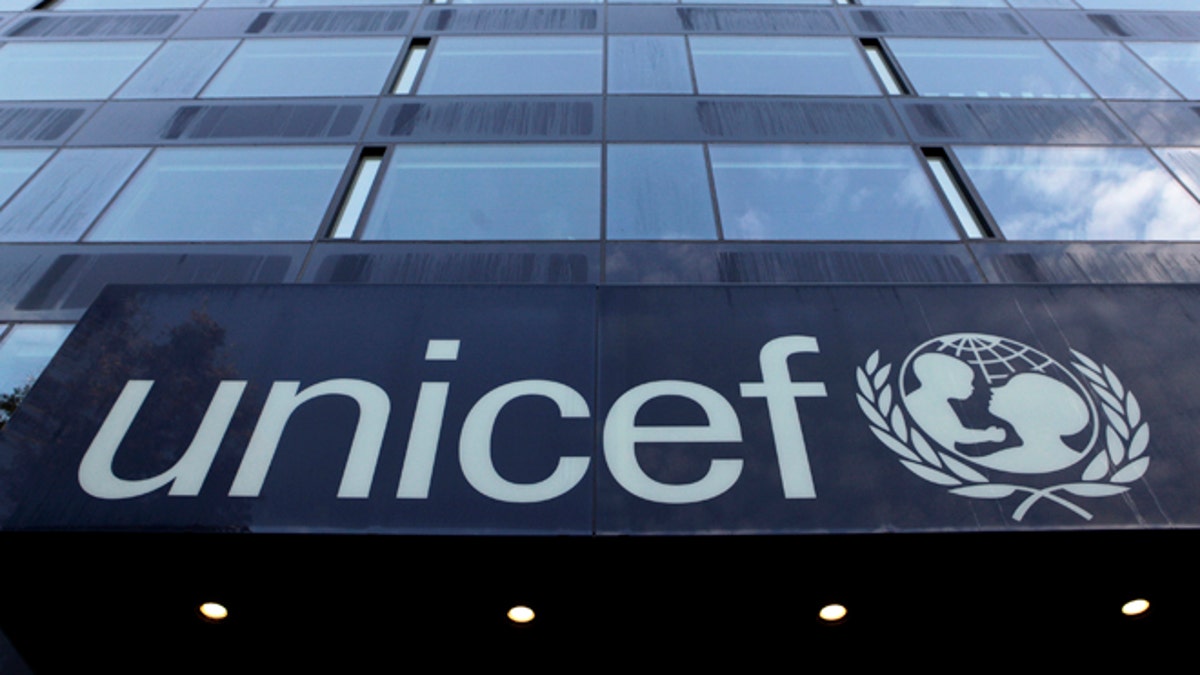
Nov. 17, 2009: The UNICEF logo is pictured on a building in Geneva. (Reuters)
With governments increasingly unwilling to contribute funds, UNICEF is gambling that it can entice more than half a billion additional dollars from private individuals and multinational corporate partners over the next three years — and rebrand itself as a different kind of 21st Century global child welfare agency in the process.
Rather than quaint card sales and local fundraisers — most of which have been phased out or sidelined — the U.N. child agency is placing an ever-higher emphasis on “multi-year, integrated corporate partnerships,” with companies and international foundations, coordinated lobbying (in U.N.-speak known as “advocacy”) in political capitals around global UNICEF goals, and “fundraising from major individual donors.”
In order to meet those goals, UNICEF intends to walk and talk more like what it has already become: one of the world’s biggest charitable businesses, with a “universal mandate for all the world’s children, a strong brand, and a global presence,” as an internal strategy document puts it.
Along with its ambitions comes a big sell.
In order to “maximize revenue from the private sector for UNICEF programs,” the agency will focus private fundraising resources “on the markets with the highest growth potential” — an agency spokesperson clarified that to mean greater emphasis on fast-growing emerging markets particularly in Asia and Latin America.
In these areas, as a UNICEF fundraising document puts it, the focus will be on “capturing market share through aggressive acquisition of pledge donors.”
Translation: UNICEF will push individual middle-class givers to sign up for long-term pledges rather than individual contributions, and “more than double gross revenue over the next four years.”
In wealthier, more established markets, the heightened focus is on big check-writing individuals “defined as those giving or with the potential to give at least $100,000 per year.”
Not to be neglected are the soon-to-be-dead. UNICEF intends to “build on a sizeable database of UNICEF supporters in the many countries with increasingly wealthy ageing populations who will be “invited to leave a legacy to UNICEF” — meaning write the agency into their wills. “Returns can be expected beyond the 2014-2017 period, “a strategy document notes.
As for big business itself, the agency will look for corporate partnerships with “higher revenue potential,” while “favoring and encouraging those partnerships that generate quality revenue.”
At the same time, “UNICEF will leverage partnerships for their value beyond cash revenue,” which will include “promotion and advancement of “child rights in business practices and beyond,” as well as “reaching new audiences with UNICEF messaging, acquiring new donors, and building the profile and value of the UNICEF brand.” Private foundations will get similar treatment, for similar aims.
Along with the direct fundraising will come many more exhortations around the world to “influence decision makers to support and implement actions that contribute to the fulfillment of children’s rights,” as UNICEF defines them. UNICEF hopes to develop a new “bridging framework” to “implement global [fundraising] strategies at the national level.”
All in all, the agency projects that its new techniques will bring in about $1.25 billion from the global private sector this year, a tally that it expects could rise to $1.75 billion a year by 2017, a 40 percent hike.
That money, and much more, is needed to meet a hyper-ambitious UNICEF strategic plan which went into effect last year, and which calls for UNICEF to gather some $18.7 billion for its programs and bureaucratic spending between 2014 and 2017.
That is an average of $4.7 billion a year during the four years, and a 20 percent increase over the previous four year period--in the midst of widespread global economic weakness, especially in Western Europe and Japan.
UNICEF also plans to stow another $8 billion in specially designated trust funds over the same period — about double what it put into the funds between 2010 and 2013.
CLICK HERE FOR THE 2014-2017 BUDGET OUTLINE
UNICEF’s expanded private-sector fundraising ambitions were specifically reviewed and endorsed last week during a three-day session of the agency’s 36-member executive board — the U.S. is a member — which ended Feb. 5.
CLICK HERE FOR THE FUNDRAISING STRATEGY REPORT
At the same session, board members got a slightly more jaundiced view of UNICEF’s fundraising efforts in reports by the U.N.’s external Board of Auditors, and a special financial watchdog committee of the U.N. General assembly, known as the Advisory Committee on Administrative and Budgetary Questions, or ACABQ.
In those documents — which only covered UNICEF activities in 2013 — the auditors noted that despite strenuous UNICEF efforts, the national committees of the organization which do most of the current fundraising still retain an average of 24 percent of their proceeds for their own use, and in rare cases up to “more than 100 percent.”
The independent Board of Auditors also noted in their report that “UNICEF has not analyzed why the expenses of its country offices’ private sector fundraising activities vary so greatly, nor has it sought opportunities to enhance the efficiency and effectiveness of such activities.”
The auditors further observed that among local contractors who actually carried out UNICEF’s humanitarian programs, many lacked “performance assessments” analyzing how well they did their jobs, or their capacity to even try. Nor, they noted, did UNICEF require that its country offices carry out such assessments.
UNICEF managers say that they will develop a “simplified assessment tool” to “assist” its offices in doing that — sometime before the end of June 2015. The management response said nothing about making that assessment mandatory.
George Russell is editor-at-large of Fox News and can be found on Twitter: @GeorgeRussell or on Facebook.com/George.Russell.






































